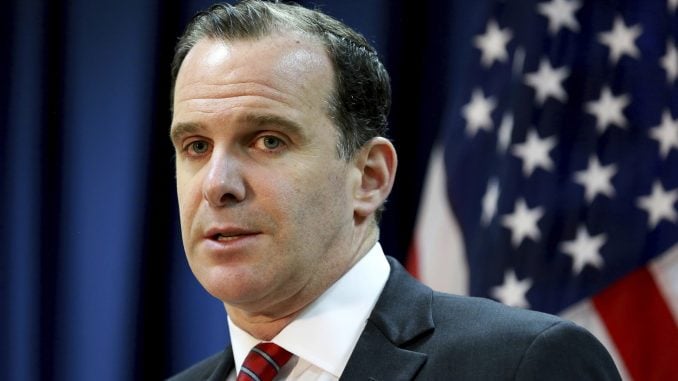
Only 11 days ago, McGurk had said it would be “reckless” to consider IS defeated and therefore would be unwise to bring American forces home. He decided to speed up his plan to leave in mid-February.
McGurk, appointed to the post by President Barack Obama in 2015 and retained by Trump, said in his resignation letter that the militants were on the run, but not yet defeated, and that the premature pullout of American forces from Syria would create the conditions that gave rise to IS. McGurk also cited gains in accelerating the campaign against IS, but that the work was not yet done.
His letter, submitted Friday to Secretary of State Mike Pompeo, was described to The Associated Press on Saturday by an official familiar with its contents. The official was not authorized to publicly discuss the matter before the letter was released and spoke on condition of anonymity.
McGurk, whose resignation is effective Dec. 31, was planning to leave the job in mid-February after a U.S.-hosted meeting of foreign ministers from the coalition countries, but he felt he could continue no longer after Trump’s decision to withdraw from Syria and Mattis’ resignation, according to the official.
Trump has ordered the withdrawal of all 2,000 U.S. troops from Syria. Many lawmakers have called his action rash and dangerous.
Mattis, perhaps the most respected foreign policy official in the administration, announced on Thursday that he will leave by the end of February. He told Trump in a letter that he was departing because “you have a right to have a Secretary of Defense whose views are better aligned with yours.”
The U.S. began airstrikes in Syria in 2014, and ground troops moved in the following year to battle IS and train Syrian rebels in a country torn apart by civil war. Trump, in a tweet this past week, abruptly declared their mission accomplished.
McGurk, 45, previously served as a deputy assistant secretary of state for Iraq and Iran, and during the negotiations for the landmark Iran nuclear deal by the Obama administration, led secret side talks with Tehran on the release of Americans imprisoned there.
McGurk, was briefly considered for the post of ambassador to Iraq after having served as a senior official covering Iraq and Afghanistan during President George W. Bush’s administration.
A former Supreme Court law clerk to the late Chief Justice William Rehnquist, McGurk worked as a lawyer for the Coalition Provisional Authority in Iraq after the 2003 U.S.-led invasion and joined Bush’s National Security Council staff, where in 2007 and 2008, he was the lead U.S. negotiator on security agreements with Iraq.
Taking over for now for McGurk will be his deputy, retired Lt. Gen. Terry Wolff, who served three tours of active duty in Iraq.
Jim Jeffrey, a veteran diplomat who was appointed special representative for Syria engagement in August, is expected to stay in his position, officials said.
